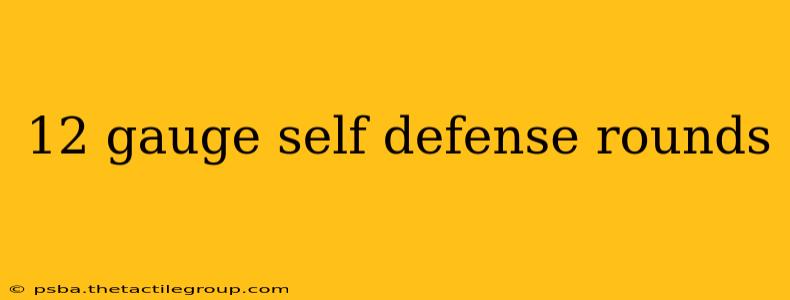Choosing the right ammunition for home defense is a critical decision, impacting the safety of your family and your legal standing in the event of a self-defense situation. This guide focuses specifically on 12 gauge self-defense rounds, exploring various options and factors to consider when making your selection. We'll delve into the ballistic properties, legal implications, and practical considerations to help you make an informed choice.
Understanding the 12 Gauge Platform
The 12 gauge shotgun is a popular choice for home defense due to its readily available ammunition, stopping power, and relatively simple operation. Its large bore diameter delivers significant energy transfer, increasing the likelihood of stopping a threat quickly. However, the wide variety of 12 gauge rounds available can be overwhelming.
Types of 12 Gauge Self-Defense Rounds:
Several types of 12 gauge rounds are specifically designed for self-defense, each with its own advantages and disadvantages:
1. Buckshot:
- Description: Contains multiple pellets (typically 00, 000, or 4 buck) within a single shell. 00 buck (double-ought) is a common choice, offering a balance between pattern density and range.
- Advantages: High stopping power at close range, relatively easy to find.
- Disadvantages: Significant recoil, potential for overpenetration, wider spread at longer ranges, reducing accuracy.
2. Birdshot:
- Description: Contains numerous smaller pellets, typically used for hunting small birds.
- Advantages: Less recoil than buckshot.
- Disadvantages: Significantly less stopping power than buckshot; may not be effective for self-defense. High risk of overpenetration with some loads.
3. Slugs:
- Description: A single, large projectile designed for longer-range accuracy. Several types exist, including rifled slugs for improved accuracy.
- Advantages: High stopping power, increased accuracy at longer ranges.
- Disadvantages: High recoil, potential for significant overpenetration, less effective in close quarters due to a smaller spread pattern.
4. Less-Lethal Options:
- Description: Rounds designed to incapacitate without causing lethal injury. These include rubber slugs, beanbag rounds, and other less-lethal projectiles.
- Advantages: Reduced risk of lethal injury.
- Disadvantages: May not be effective in stopping a determined attacker. Effectiveness is highly dependent on the assailant and the situation. Always check local laws on the legality and use of less-lethal options for self-defense.
Factors to Consider When Choosing Ammunition:
- Overpenetration: A critical concern in home defense. The risk of a round passing through a target and striking an innocent bystander is significantly higher with certain types of ammunition.
- Stopping Power: The ability of a round to immediately incapacitate a threat. This is a complex issue, and the effectiveness of any round depends on many factors.
- Recoil: The force the shotgun imparts to the shooter upon firing. Excessive recoil can affect accuracy and control, especially in stressful situations.
- Pattern Density: The concentration of pellets in the spread at a given distance. A dense pattern increases the likelihood of hitting a vital area.
- Legal Considerations: Laws regarding self-defense and the use of force vary significantly by location. Consult local laws and regulations before choosing ammunition.
Conclusion:
Choosing the right 12 gauge self-defense rounds requires careful consideration of various factors. While buckshot remains a popular choice for its stopping power, the risk of overpenetration is significant. Understanding the properties of different ammunition types, considering legal implications, and practicing with your chosen load are crucial for effective and responsible self-defense. This information is for educational purposes only and should not be considered legal or professional advice. Always consult with law enforcement and legal professionals for advice specific to your situation and location.

